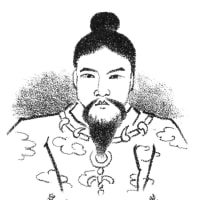『日本書紀』欽明天皇 34
是月、或有譖馬飼首歌依曰「歌依之妻逢臣讚岐、鞍韉有異。就而熟視、皇后御鞍也。」卽收付廷尉、鞫問極切、馬飼首歌依乃揚言誓曰「虛也、非實。若是實者、必被天災。」遂因苦問、伏地而死。死未經時、急災於殿。廷尉、收縛其子守石與名瀬氷守石・名瀬氷、皆名也、將投火中投火爲刑、蓋古之制也、呪曰「非吾手投、以祝手投。」呪訖欲投火、守石之母祈請曰「投兒火裏、天災果臻。請、付祝人使作神奴。」乃依母請、許沒神奴。
秋七月己巳朔、新羅遣使獻調賦。其使人、知新羅滅任那、恥背國恩、不敢請罷。遂留、不歸本土。例同國家百姓、今河內國更荒郡鸕鷀野邑新羅人之先也。
≪英訳≫
In this month, someone made a slanderous report about Umakai-no-Obito Utayori (馬飼首 歌依). They said, “There’s something strange about the saddlecloth belonging to Utayori’s wife, Au-no-Omi Sanuki (逢臣 讃岐) – it looks exactly like one that the Empress uses.” Utayori was arrested, handed over to the officials, and severely questioned.
Utayori defended himself, swearing, “This is a lie! If it’s true, then let heaven’s punishment fall upon me.” However, the torture was so intense that he eventually collapsed and died. Not long after his death, a sudden fire broke out in the Great Hall (大殿Ootono). The officials captured Utayori’s sons, Moriishi (守石) and Nasei (名瀬水), intending to throw them into the fire as a curse. They recited, “It’s not by our hands that they are thrown in – it is the hands of the hafuri (祝 はふりa kind of priest).”
Moriishi’s mother begged, saying, “If you throw the children into the fire, a calamity from the heavens will surely come upon us. Please, let them serve as hafuribe (祝人) and become kamu-yakko (神奴 slaves who serve the gods).” Her plea was granted, and the children were spared and made into kamu-yakko.
In the autumn, on the first day of the seventh month, Silla sent an emissary with tribute. This envoy knew that Silla had destroyed Mimana, so he felt shame for betraying the Emperor’s grace. He did not dare to return to his homeland and decided to stay, never returning. Treated as if he were an ordinary citizen of Japan, he became the ancestor of the people from Silla (Shiragibito) who currently reside in Uno-no-Sato (鵾野邑,) in Sarara-Kori (更荒郡) in Kawachi Province (河内国) (present-day Shijonawate, Osaka Prefecture).
≪この英文の和訳≫
この月、ある人物が馬飼首(うまかいのおびと)の歌依(うたより)について讒言をした。「歌依の妻である逢臣(あうのおみ)の讃岐(さぬき)の鞍の下掛けには妙なところがあり、よく見ると皇后陛下がご使用になるものとそっくりである」と述べたのである。歌依は捕らえられ、役人に引き渡されて厳しく尋問された。
歌依は弁解をし、誓って言った。「これは嘘でございます。もしこれが真実であれば、きっと天の罰が下るでありましょう」。しかし、拷問が苛烈であったため、ついに歌依は地に伏して死んでしまった。その死後、間もなく大殿に火災が起きたのである。役人は歌依の子である守石(もりいし)と名瀬水(なせみ)を捕らえ、火の中に投げ入れようとして呪いの言葉を唱えた。「我が手ではなく、*祝(はふり)の手が投げ入れるのだ」と。
*はふり【祝】
《罪やけがれを放(はふ)り清める意》神社に属して神に仕える職の一。ふつう神主・禰宜ねぎより下級の神職をいう〔コトバンク〕
すると、守石の母は懇願した。「もしこの子供たちを火中に投げ入れれば、天災が起こるでしょう。どうか彼らを祝人(はふりべ)として神奴(かむやっこ 神社に仕える賤民)にしてくださいませ」。母の願いが受け入れられ、二人は許されて神奴とされた。
秋七月の一日、新羅(しらぎ)は使者を遣わし、貢ぎ物を献上した。この使者は、新羅が任那(みまな)を滅ぼしたことを知っており、天皇のご恩を裏切ったことを恥じていたため、あえて帰国を望まず、ついに日本に留まり本国には帰らなかったのである。この使者は日本の民(百姓)と同じように扱われ、現在、河内国(かわちのくに)更荒郡(さららのこおり)鵾野邑(うののさと 大阪府四條畷市)に住む新羅人(しらぎびと)の先祖となった。
令和6年11月8日(金) 2024













